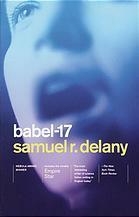You need to sign in or sign up before continuing.
Take a photo of a barcode or cover
adventurous
Note: The book also came with the novella Empire Star, also written by Samuel R. Delany, but I only read the Babel-17 portion of it.
I finished Babel-17 a little over three months ago but neglected to write a review until now. Mainly due to work and other circumstances, but also because I was so put off by the book. I can't say I've ever read an award-winning science fiction novel that disagreed with me as much as Babel-17 (I absolutely loathed Forever Free by Joe Haldeman but that wasn't an award-winning book).
Which isn't to say that the book is necessarily bad. Babel-17 was first published in 1966, around the time when science fiction began exploring new and speculative subject matter (Frank Herbert and Ursula K. Le Guin come to mind) and I'm sure back then Samuel R. Delany and Babel-17 helped expand the genre's realms. Reading it now, however, I just see a jumbled mess of a narrative with some interesting ideas. And I think the jumbled mess of a narrative was intentional.
The main issue is that I'm not overly interested (or familiar) with the central themes of Babel-17: language/linguistics and its power. As a result, I found the book incredibly obtuse and confusing. It was also awfully dense, although I think that's more because Delany tried to fit this linguistic mystery set in a grand sci-fi setting into less than 200 pages. The most disappointing thing for me is that between the lengthy monologues and expositions on language (urgh) there are the makings of a grand adventure in an incredibly interesting sci-fi universe. The alliances and wars spanning multiple galaxies, the discorporeal crew members (the crew in general was kinda wild)... Unfortunately, Delany just glances over world-building and by the second half of the book it's practically nothing but the hardcore linguistics stuff. I should have seen it coming, especially when they introduced the main character, the heroic starship commander and poet. Bleh.
4 out of 10
I finished Babel-17 a little over three months ago but neglected to write a review until now. Mainly due to work and other circumstances, but also because I was so put off by the book. I can't say I've ever read an award-winning science fiction novel that disagreed with me as much as Babel-17 (I absolutely loathed Forever Free by Joe Haldeman but that wasn't an award-winning book).
Which isn't to say that the book is necessarily bad. Babel-17 was first published in 1966, around the time when science fiction began exploring new and speculative subject matter (Frank Herbert and Ursula K. Le Guin come to mind) and I'm sure back then Samuel R. Delany and Babel-17 helped expand the genre's realms. Reading it now, however, I just see a jumbled mess of a narrative with some interesting ideas. And I think the jumbled mess of a narrative was intentional.
The main issue is that I'm not overly interested (or familiar) with the central themes of Babel-17: language/linguistics and its power. As a result, I found the book incredibly obtuse and confusing. It was also awfully dense, although I think that's more because Delany tried to fit this linguistic mystery set in a grand sci-fi setting into less than 200 pages. The most disappointing thing for me is that between the lengthy monologues and expositions on language (urgh) there are the makings of a grand adventure in an incredibly interesting sci-fi universe. The alliances and wars spanning multiple galaxies, the discorporeal crew members (the crew in general was kinda wild)... Unfortunately, Delany just glances over world-building and by the second half of the book it's practically nothing but the hardcore linguistics stuff. I should have seen it coming, especially when they introduced the main character, the heroic starship commander and poet. Bleh.
4 out of 10
challenging
inspiring
reflective
medium-paced
Plot or Character Driven:
A mix
Strong character development:
Yes
Loveable characters:
Yes
Diverse cast of characters:
Yes
Flaws of characters a main focus:
Complicated
adventurous
challenging
emotional
hopeful
fast-paced
Plot or Character Driven:
A mix
Strong character development:
Yes
Loveable characters:
Yes
Diverse cast of characters:
N/A
Flaws of characters a main focus:
No
adventurous
challenging
reflective
fast-paced
Plot or Character Driven:
A mix
Strong character development:
Complicated
Loveable characters:
Complicated
Diverse cast of characters:
Yes
Flaws of characters a main focus:
Complicated
adventurous
challenging
medium-paced
Maybe my least favorite Delany novel so far? Babel-17, I mean. I haven't read Empire Star yet. The ideas in it (probing the ways in which language shapes thought) are exciting if somewhat, at this point, dated. The characters were not as compelling to me as other Delany characters and it's a LOT of dialogue. Some truly cringe-inducing sentences ("She had entered him in some bewildering reversed sexuality." (181)). But, he was 23. As always with Delany, ambitious and original in its approach to SF tropes and some terrific queer/weird flourishes (triples, here; and nonhuman characters both chimerical and discorporate--Slug, for example, and Brass, a giant lion (or lion/man?)).
I loved how two books with such different narration styles and settings connected through a single character link. The fact that Delaney wrote these in the 1960's blows my mind considering how the book deals with concepts such as polyandry & body morphing and features an incredibly strong female character.
Babel-17 made me think about the influence of language over thought. World building takes a backseat here as the novel delves into the concept of self and the implication of a langugage that has no sense of self. It's an interesting read that puts the Sapir Whorf Hypothesis a science fiction setting.
Babel-17 made me think about the influence of language over thought. World building takes a backseat here as the novel delves into the concept of self and the implication of a langugage that has no sense of self. It's an interesting read that puts the Sapir Whorf Hypothesis a science fiction setting.
adventurous
fast-paced
Plot or Character Driven:
A mix
Strong character development:
Yes
Loveable characters:
Yes
Diverse cast of characters:
Yes
Flaws of characters a main focus:
No





